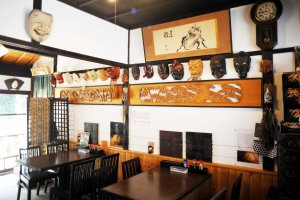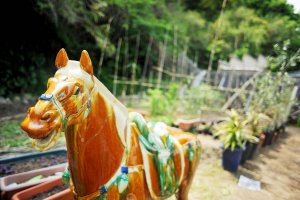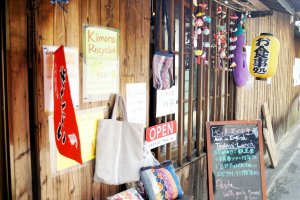The Seto Inland Sea lies between Honshu, Shikoku and Kyushu, and includes some 3000 islands, most of which are inhabited. Historically it's calm waters served as an important trade route, and today the area is particularly famous for its art islands - Naoshima and Teshima - and the Setouchi Triennale. If you're interested in the history of this little-explored part of Japan and to sample a small bit of its cuisine, drop by Cafe Seven Islands in Honmura, Naoshima.
The cafe is owned and run by the amiable Iwao Yokoyama, who is a fount of local knowledge. Come for the food, but stay and have a chat with him if he's not busy. He's more than happy to share his knowledge of the history and customs of the islands, and speaks excellent English. Iwao was originally from neighbouring Shodoshima, and moved to Naoshima Island six years ago. Opened in 2013, the cafe is situated in the Art House Project area, right next to the Ishibashi museum.
The specialty of the cafe is chagayu, a type of porridge that was commonly eaten in Shiwaku Islands. Traditionally, the food is prepared with goishicha, a rare dark fermented tea from Kochi prefecture, but Iwao has substituted it with hojicha to suit general taste. The dish is accompanied by a piece of whole dried fish and side dishes that might include vegetable pickles, seaweed and kanroni, fish that has been cooked in soya sauce for a long time.
Another specialty dish is the tamago kake gohan, a traditional Japanese breakfast that he serves for lunch. The set is made up of rice, a raw egg and side dishes similar to that for chagayu. As much as possible, Iwao uses local products from the Seto Inland Sea such as Naoshima salt, seaweed from Shodoshima, pasta from Awaji Island and fish from the Inland Sea.
Even ordinary favourites like curry rice have a twist to it. Influenced by the curry from Iejima Islands, he uses shrimp water to cook the curry paste with, and includes a deep-fried prawn and a prawn cracker with the dish.
This charming little cafe, which has a garden at the back, is adorned with Japanaese craft and antiques, of which Iwao is an avid collector. Ask him about any of the masks that adorn the walls or the collectibles that line the shelves. You'll be sure to get an interesting story out of it. You can also find beautiful used kimonos in excellent condition for sale, as well as bags, purses and tissue box covers made from recycled kimonos by a disabled people's association in Uno.
Food and conversation have always been a perfect combination, and at this cafe on Naoshima, you will find both.



































